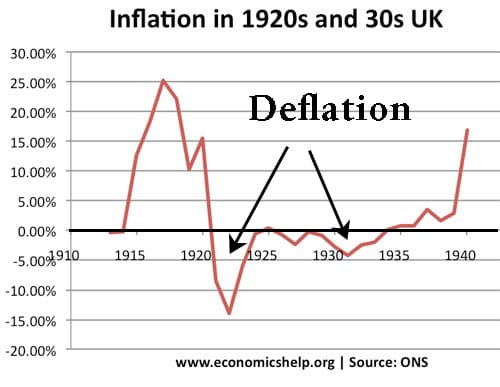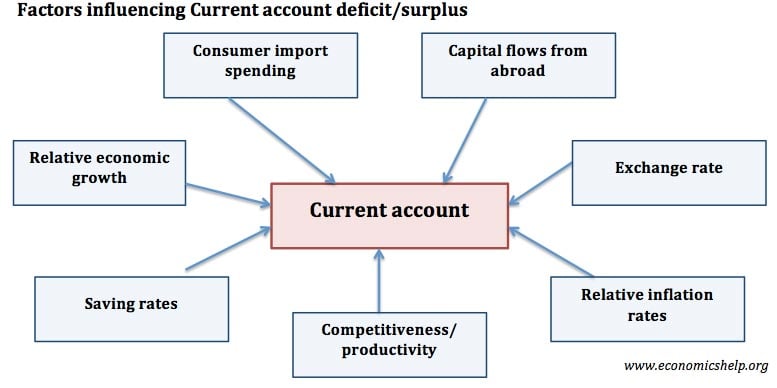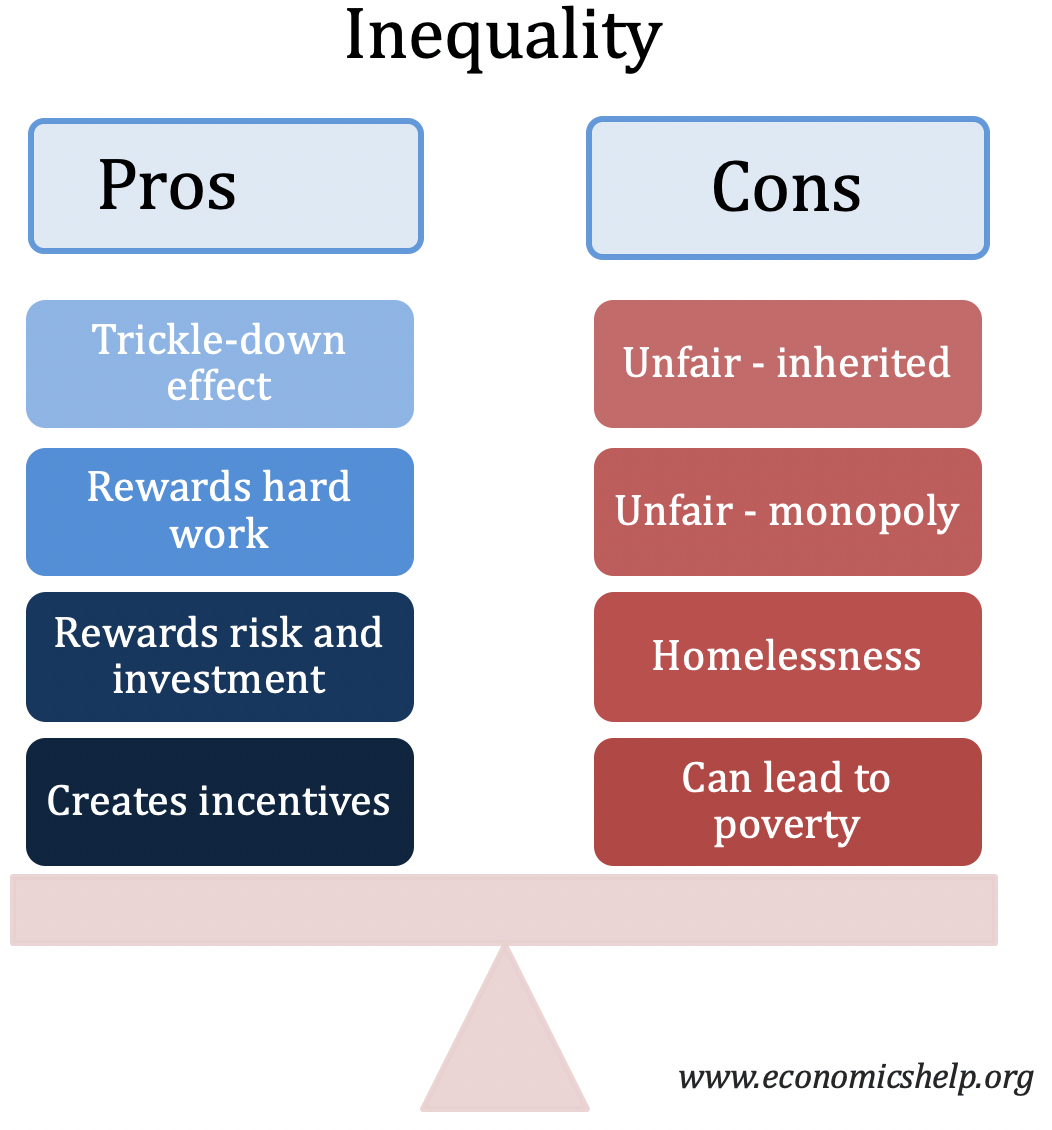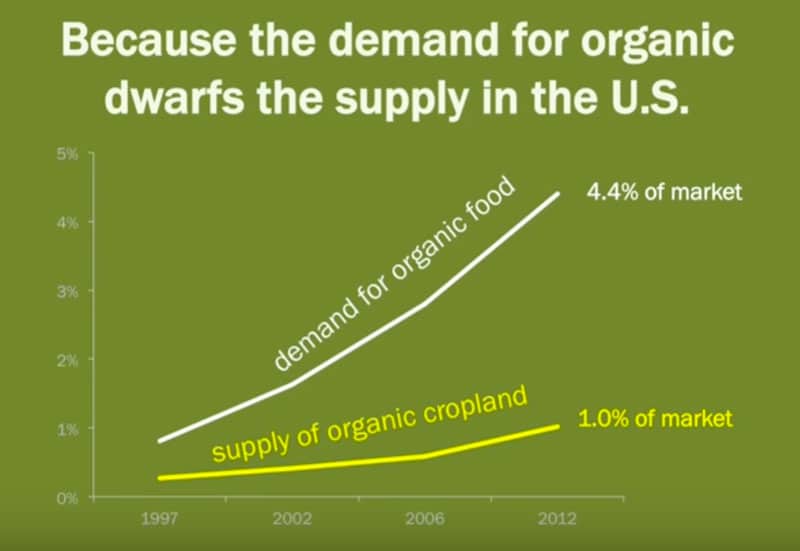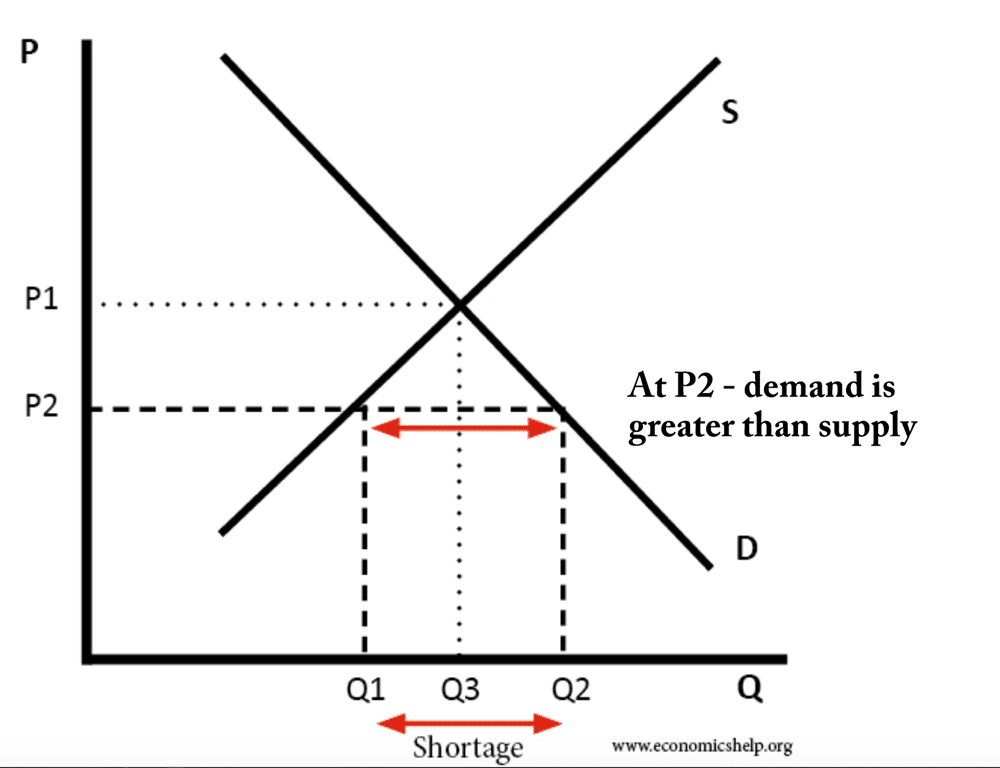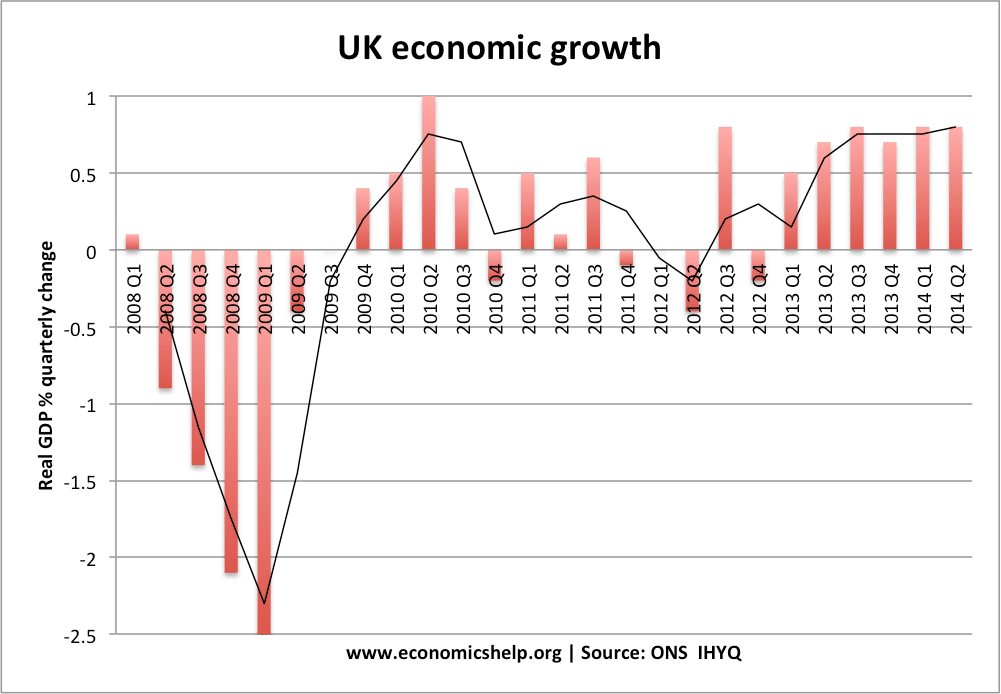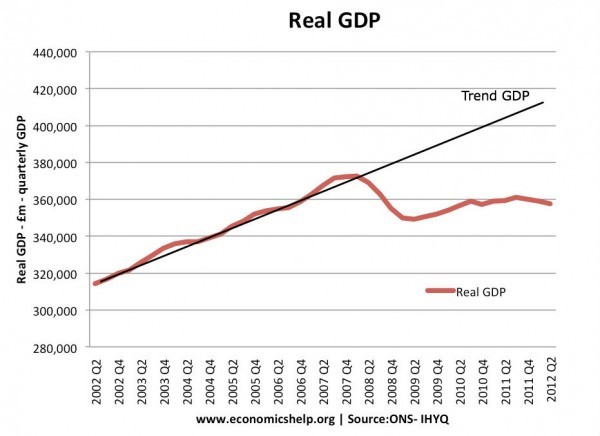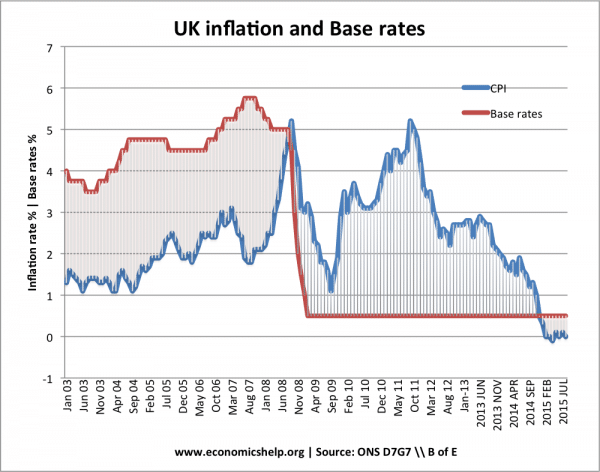The great recession refers to the economic downturn between 2008 and 2013. The recession began after the 2007/08 global credit crunch and led to a prolonged period of low/negative growth, rising unemployment and a period of fiscal austerity. In particular, the great recession highlighted problems within the Eurozone which experienced a double-dip recession and high unemployment.
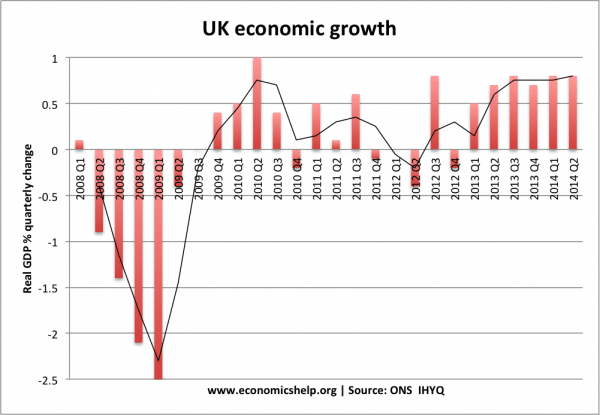
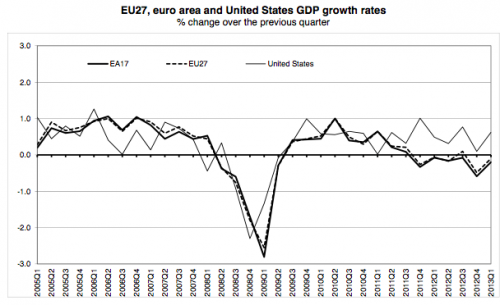
Recession in US and EU. Source: Eurostat
Output gap
Graph showing how much real GDP fell behind the trend growth in the UK. Unlike previous recessions, the economy did not catch up the lost output.
Causes of the great recession 2007-08
The primary cause of the great recession was the credit crunch (2007-08) where the global banking system became short of funds, leading to a decline in confidence and decline in bank lending. The causes of the credit crunch were quite complicated but in summary.
- In 2000-2007, US banks made a big increase in sub-prime mortgage loans. These mortgages were very risky, but there was a good deal of ‘irrational exuberance‘ and belief house prices would keep rising.
- US mortgage companies sold these ‘risky mortgage bundles’ on to banks around the world. (Credit rating agencies gave them AAA ratings – despite the fact they were very risky.)
- Starting around 2005, US interest rates rose, and homeowners in the US began to default on these risky mortgages.
- US banks lost money, but also banks around the world later realised the ‘safe’ mortgage bundles they bought were actually useless. So many banks around the world saw a big fall in liquidity and value of their assets.
See more at: Credit crunch for a more detailed account
The recession was also caused by
- Credit crunch led to a fall in bank lending, due to a shortage of liquidity.
- Fall in consumer and business confidence resulting from the financial instability.
- Fall in exports from the global recession.
- Fall in house prices leading to negative wealth effects.
- Fiscal austerity compounded the initial fall in GDP.
- In Europe, the single currency created additional problems because of over-valued exchange rates, and high bond yields.
More details on causes of great recession
- Great Moderation. The period 2000-2007 was a time of strong economic growth, low inflation and falling unemployment. Central Banks appeared to be successful in targeting low inflation and ensuring economic stability. However, underneath the macro-economic stability, there was growing instability regarding credit and financial markets.
- Housing bubble. Many countries experienced a rapid growth in house prices. House price rose faster than inflation and faster than incomes. This boom in housing was encouraged by a growth in bank lending and high confidence. Several countries, such as Ireland and Spain also experienced a boom in house building.
 Irish and UK housing price fall in 2008.
Irish and UK housing price fall in 2008. - Bad loans. In the period leading up to the credit crunch, banks became more aggressive and willing to take risks in lending. Especially in America, banks and mortgage companies loosened their criteria for giving mortgages. Many homeowners were given large mortgages, with limited checks on their ability to repay. However, in the economic downturn, people were left with mortgages they couldn’t afford.
- Bad loans repacked and resold. These ‘bad’ mortgage loans were sold onto other financial institutions around the world. For example, many UK and European banks bought these mortgage bundles from the US (CDOs) and so were exposed to any potential losses in the US housing market.
- Housing Bubble Burst. In 2006, the US housing market bubble burst. House prices started to fall, and there was a rise in mortgage defaults. Banks began to realise they had lost significant sums of money through the US mortgage defaults.
- Banks short of liquidity. The scale of bank losses started to increase and it became harder for banks to borrow money on money markets. This caused banks to reduce loans and mortgages. Because banks were losing money, it became challenging to get credit and liquidity. Some banks lost so much they were running out of money. In several countries, such as UK, Ireland and US, major banks had to be bailed out by the government. But, the realisation banks were short of liquidity harmed consumer and investor confidence. The fall in confidence led to lower spending and investment.
- Rise in oil prices. In 2008, there was also a peak in oil prices. This complicated matters because it caused cost-push inflation. This cost-push inflation made Central Banks more reluctant to cut interest rates. Also, higher oil prices reduced discretionary income and led to lower spending. Usually, in a recession, oil prices fall. However, because of rising demand in China and India, we saw rising oil prices – even as Europe and the US went into recession. High oil and commodity prices was another factor reducing demand.
The impact of the credit crunch and recession
- In 2008, all major economies experienced a very sharp drop in real GDP. The banking crisis severely curtailed normal bank lending. The result was a fall in investment and consumer spending leading to a sharp drop in real GDP.
- The fall in house prices was another factor leading to recession. In the boom years, rising house prices (and wealth) underpinned higher consumer spending. When house prices dropped, many homeowners faced negative equity. Therefore, they cut back on spending and could no longer rely on re-mortgaging to gain equity withdrawal.
- The global nature of the crisis meant that there was also a drop in world trade. Countries saw a drop in exports as the global downturn led to lower demand.
- Unemployment. Unemployment rose in US and Eurozone.
- Government debt. Government debt rose sharply due to the recession. This ushered in a period of ‘austerity’ with many governments in Europe seeking to cut spending.
- Euro crisis. The Eurozone saw a rise in bond yields in 2010-12 – partly due to recession, and also due to lack of Central Bank willing to intervene.
Response to the great recession
- Bank rescues. Firstly, governments felt obliged to intervene in the banking sector to avoid banks and financial institutions going bust. However, there was some reluctance to bailout those who were blamed for causing the crisis. In 2008, the US decided to allow Lehman Brothers to go bust. This caused a major loss of confidence. After the panic this created, governments realised they couldn’t allow a repeat of this experience. In the UK, the government intervened to bailout out major banks, such as Northern Rock, and Lloyds TSB.
- Cuts in interest rates. Towards the latter half of 2008 and early 2009, Central Banks cut interest rates to record low levels. The UK cut base rates from 5% to 0.5%. Usually, a major cut in interest rates would make borrowing cheaper and encourage consumption and investment. (e.g. in 1992, when the UK cut interest rates, the economy recovered fairly quickly.) However, cuts in interest rates were less effective in this period.
- Expansionary fiscal policy. The deep recession saw a sharp rise in budget deficits because government tax revenues evaporated. This was particularly noticeable for countries who relied on stamp duty and tax from the finance sector. However, in the UK and US, there was a moderate degree of fiscal expansion. The UK introduced a temporary cut in VAT. In the US, there was also a moderate fiscal stimulus.
- It is worth noting that in comparison to the great depression of the 1930s, two things were avoided in the great recession.
- Large number of banks going bankrupt was avoided (In the 1930s, in the US over 500 commercial banks went bankrupt)
- There was no major trade war. In the 1930s, a tariff war developed as countries tried to protect domestic industries.

